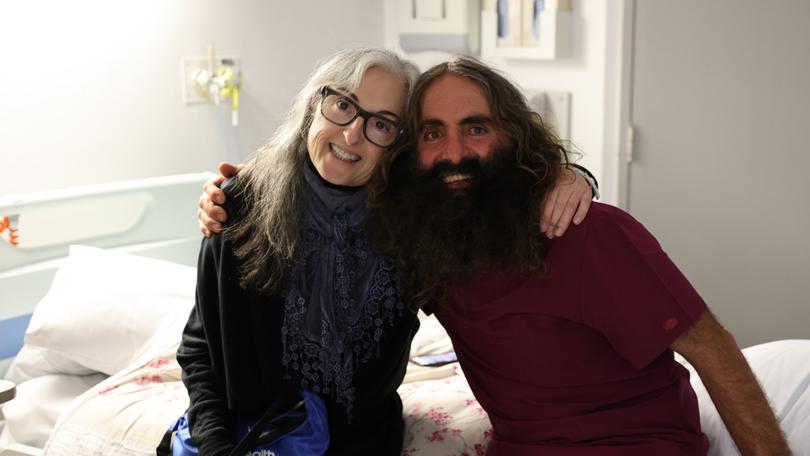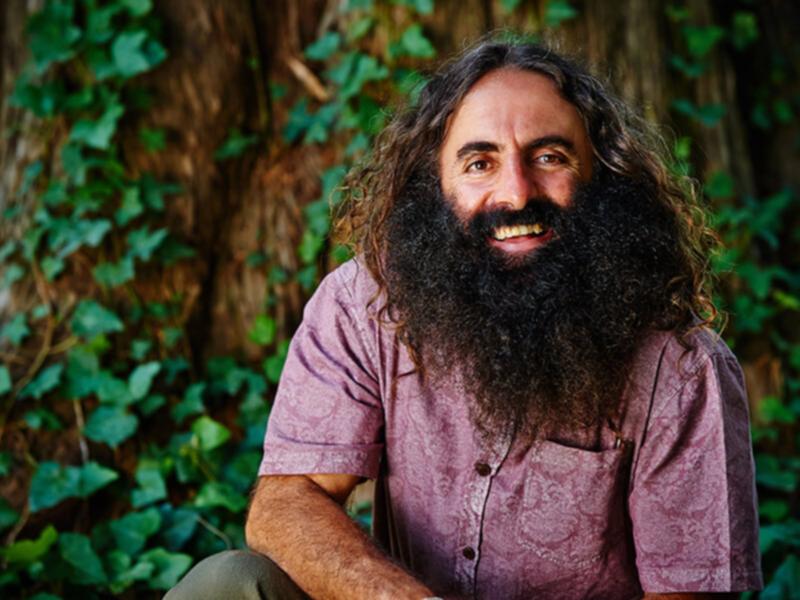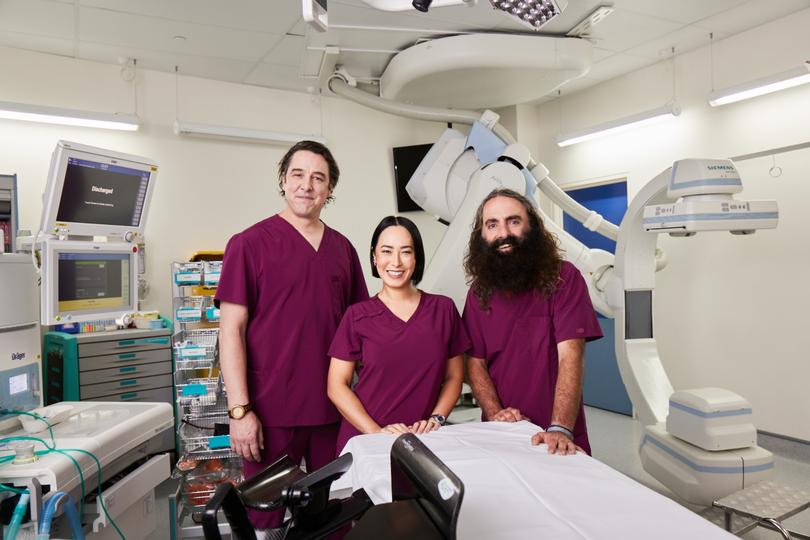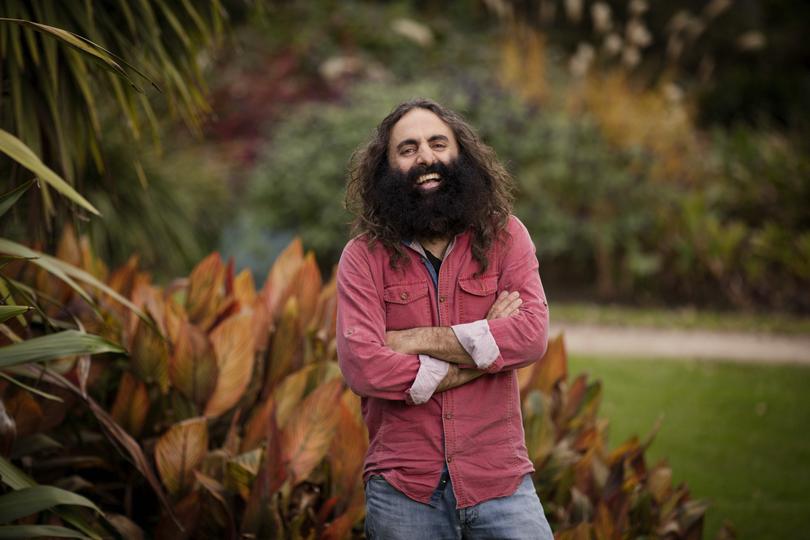The Hospital TV show: Costa Georgiadis confronted by life and death
Costa Georgiadis was embedded in a public hospital for a new docuseries when he chanced upon a friend in the last place you’d expect to see someone you know.

When Costa Georgiadis walked into a palliative care room in the Sacred Heart Hospice, he wasn’t expecting to see his old school friend, actor Camilla Ah Kin.
For a moment, he forgot where he was. He was just excited to see Camilla, with the same enthusiasm you have when you run into a friend on the street, someone you hadn’t caught up with in a while.
Then it dawned on him the significance of the place, and what it meant if Camilla was sitting on that bed.
Sign up to The Nightly's newsletters.
Get the first look at the digital newspaper, curated daily stories and breaking headlines delivered to your inbox.
By continuing you agree to our Terms and Privacy Policy.“It was like, hang on a second, I’m not over in the main building (of the hospital), I’m on the other side of the street on the top floor, which is palliative care, which is, basically, the end station,” Georgiadis told The Nightly. “What the hell are you doing in here?”
Georgiadis, the Logie winner and popular host of Gardening Australia, was filming a docuseries called The Hospital: In the Deep End, and that day, he was embedded with the palliative care unit at St Vincent’s Hospital in Sydney.
Camilla’s room was the fourth one he walked into that day and the producers, who were not aware of their connection, had only told him the next person he was interviewing was a woman named Camilla.

“Then it was incumbent on me to hold it together so that she could speak about her experiences,” he recalled. “And she didn’t want people to know and that was her decision and I respected that. I had friends that I had to keep that from.
“Then it was barely a week later and she was gone.”
The Hospital follows Georgiadis, actor Samuel Johnson and presenter and food writer Melissa Leong as the three go behind the scenes of St. Vincent’s, exploring the many facets of Australia’s public healthcare system.
For all three, it was a personal and emotional journey. They all tear up many times across the three episodes as they’re confronted with the toughest moments in people’s lives, and the humanity, compassion and professionalism on display by those who work among life and death.
Johnson, whose sister Connie died from cancer and is now a campaigner and fundraiser, spends time in the oncology ward while Leong has a long shift in the emergency department, giving her a renewed appreciation of her own mother’s work as a nurse in ED.
Georgiadis’ time in the palliative care unit brought forth memories of being involved in his father’s care before death.
“We all think of the hospice and go, “Oh, that’s a heavy place, I don’t want to go in there. That’s death, that’s the end.
“Yet, you go there and those staff, they’re not living in death. Their language is life and celebrating life by the second, by the hour, by the day. There’s so much we could take away from that and seeing the way they come to work. Basically, they’re doing more for the families than they are for the patients.
“They’re beautiful, caring people that turn up and do their job and they need the backing and they deserve to be paid and supported for this incredible community service.”

The presenter also spent time with a surgical team, as well as the mobile care unit, who work on outreach to Sydney’s homeless population, providing them with continuing medical services for people who might have cut their foot or have an infection. He observed a team that treated everyone with dignity, no matter their circumstances.
Two intense years of the pandemic put the spotlight on the system and the gruelling, often unrecognised work of healthcare workers but it also exposed the challenges. Australia’s public healthcare system is always crying out for more funding.
And when you see the profit-first mentality of somewhere like the United States, it’s even more urgent that people who are fortunate enough to not have day-to-day touchpoints with the system understand why it’s important.
“I want to know that if something happens, I can get picked up with exactly equal consideration and opportunity to anyone else, regardless of finances and name and title. I want to know that ambulance will come to me or to you as much as it will go to a millionaire, a billionaire, politician or anyone else.
“It’s so important. And you should be able to do that without being on the side of the road or in the middle of a cardiac episode having to find your credit card and say, ‘Excuse me, can I get in?’”

For Georgiadis, the takeaways were not just how crucial free and accessible healthcare is in any functioning society, but how complex and expansive the network is. They’re like different instruments in a symphony, it has to work together.
“You see how well-oiled it is, but at the same time, it’s fragile,” he said. “It’s not something that can just go on without receiving the understanding and the support of everyone, because it’s a system that you can only truly value when you need to call on it.
“The whole community needs to sit down and have a look at what we’ve got and understand that a public healthcare system is a living, breathing thing and it needs to be looked after.”
Ever the gardener, he couldn’t resist a nature analogy. “It’s caring for the structure as much as the produce,” he said. “You don’t just care for the fruit, you’ve got to care for the tree, and feed it constantly, look after it and nurture it. That’s what a public system is about.”
The Hospital: In the Deep End is on SBS and SBS On Demand from Thursday, June 6

